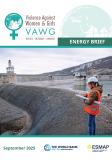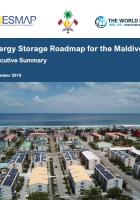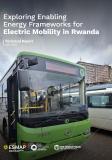Publications
The Maldives power sector currently relies on diesel generation, and this increases the country's vulnerability to global oil prices. Approximately 80 percent of the land area lies within one meter of the sea level, exacerbating the country's vulnerability to climate change impacts. The Government of Maldives fully recognizes that in order to effectively manage climate change risks in the context of sustainable development, it is necessary to integrate climate risk planning and climate change adaptation into the country's development policy and planning frameworks.
This could be achieved through utilizing natural solutions, adopting innovative and new technologies, and enhancing access to finance. For the Maldives, hybrid systems with renewable energy and energy storage system technologies are critical in moving towards low-emission development. Increasing the diversity of renewable energy technologies in the national energy mix by 2030 is the most effective way to address the target of reducing emissions. In its 2015 NDC, the Maldives has committed to reduce greenhouse gas emissions by 10 percent by 2030.
This report establishes the Maldives at the forefront of efforts by developing countries to use energy storage to integrate variable renewable energy to the grid and reduce emissions. This study provides a roadmap for adopting energy storage with solar photovoltaics (PV) for a population of ~480,000 people, enabling more renewables and reducing emissions.
ESMAP/World Bank. 2019. Energy Storage Roadmap for the Maldives: Executive Summary (English). Energy Sector Management Assistance Program (ESMAP). Washington, D.C. : World Bank Group. http://documents.worldbank.org/curated/en/340311572621106332/pdf/Executive-Summary.pdf




